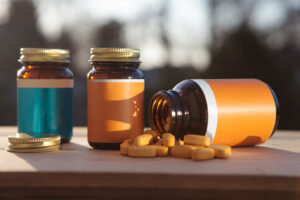Testosterone is a powerhouse hormone, a chemical that serves as a messenger in the human body and plays many roles in overall health and well-being. From energy levels to muscle growth, mood, and sexual health, it impacts nearly every aspect of life.
If you want to brush up your knowledge on testosterone, boost your health, or understand how the chemical works from the ground up, this article will give you the lowdown on it all.
What Is Testosterone and Why Does It Matter?
Testosterone is a hormone produced primarily in the testes for men and in smaller amounts in women’s ovaries. Often referred to as the “male hormone,” it’s essential for both men and women. Testosterone is also among the several byproducts of dehydroepiandrosterone (DHEA), also known as the “mother” hormone.
So, what does testosterone do?
- Supports muscle growth and strength.
- Develops the penis and testes.
- Produces sperm
- Boosts energy and stamina.
- Enhances libido (sex drive) and sexual health.
- Improves mood and mental clarity.
- Maintains bone density and overall vitality.
- Plays a role in balding in the later stages of life and in the appearance of facial and pubic hair in puberty. [1]
Healthy testosterone levels are important for physical performance, emotional balance, and long-term health.
Key Factors That Influence Testosterone Levels
Several factors can impact your testosterone levels, both positively and negatively. Understanding these can help you take control of your health.
Age
Testosterone levels naturally decline with age. Men may notice a gradual drop starting in their 30s, with levels decreasing by about 1% per year. [2] Women also experience hormonal changes, especially during menopause.
Diet and Nutrition
What you eat directly affects hormone production. A diet high in processed foods, sugar, and unhealthy fats can lower testosterone. On the other hand, nutrient-rich foods can support healthy levels.
Exercise and Physical Activity
Regular exercise, especially strength training, can boost testosterone. Sedentary lifestyles often lead to lower levels and increased health risks.
Sleep and Stress Management
Poor sleep and chronic stress increase cortisol, a hormone that can suppress testosterone production. Prioritizing rest and relaxation is key.
Natural Ways to Boost Testosterone Levels
You don’t need extreme measures to maintain healthy testosterone levels. Simple lifestyle changes can make a big difference.
Healthy Diet Tips
- Eat more protein: Protein supports muscle repair and hormone production. Incorporate lean meats, fish, eggs, and plant-based options like beans into your diet.
- Include healthy fats: Fats, like avocados, nuts, seeds, and olive oil, are essential for hormone synthesis.
- Focus on zinc and magnesium: These minerals are crucial for testosterone production. Foods like shellfish, pumpkin seeds, and spinach are great sources.
- Avoid processed foods and sugar: These can lead to weight gain and hormonal imbalances.
Effective Exercises
- Strength training: Lifting weights is one of the best ways to boost testosterone. Focus on compound exercises like squats, deadlifts, and bench presses. [3]
- High-intensity interval training (HIIT): Short bursts of intense exercise can elevate testosterone levels.
- Stay active: Daily walks or light activities can help maintain hormonal balance.
Lifestyle Changes
- Prioritize sleep: Aim for 7-9 hours of quality sleep each night. Sleep is when your body repairs and produces hormones. [4]
- Manage stress: Chronic stress raises cortisol levels, which can suppress testosterone. To relax, try meditation, yoga, or hobbies.
- Limit alcohol and avoid smoking: Both can negatively impact hormone production and overall health.
FAQs About Testosterone
How do you know if you need testosterone shots?
Low testosterone can cause a range of symptoms, including: [5]
- Fatigue and low energy.
- Reduced libido and sexual performance.
- Mood swings, irritability, or depression.
- Loss of muscle mass and strength.
- Increased body fat.
If you’ve been experiencing these symptoms, consult a healthcare provider. A simple blood test can confirm if your levels are low and whether testosterone replacement therapy (TRT) or hormone replacement therapy (HRT) is right for you.
What is free testosterone?
Free testosterone is the active form of the hormone that’s not bound to proteins in the blood. It’s important for bodily functions because it’s readily available for use. While total testosterone measures both bound and free testosterone, free testosterone is often a better indicator of hormonal health. [6]
When does testosterone peak after an injection?
For those undergoing HRT or TRT, testosterone levels typically peak 24–48 hours after an injection, but it still varies per individual. After peaking, levels gradually decline over the next few days. This pattern helps maintain stable hormone levels when injections are administered regularly.
Does nicotine increase testosterone?
Nicotine may temporarily spike testosterone levels, but the long-term effects of smoking are harmful. Smoking damages blood vessels, reduces oxygen flow, and can lead to chronic health issues.
Does testosterone make you taller?
Testosterone doesn’t increase height after puberty. During puberty, natural testosterone helps with growth spurts by promoting bone growth. However, once growth plates in the bones fuse, testosterone no longer affects height. It does, however, support bone density and muscle mass in adulthood.
Does testosterone cause hair loss?
High testosterone levels can contribute to hair loss in individuals genetically predisposed to male pattern baldness. [7] Testosterone converts to dihydrotestosterone (DHT), which can shrink hair follicles and lead to thinning hair. If hair loss is a concern, consult a healthcare provider for personalized advice.
Wrapping Up: The Importance of Maintaining Healthy Testosterone Levels
Before we conclude, let’s go through a quick recap of what you can do to boost your testosterone levels naturally:
- Eat a balanced diet: Focus on protein, healthy fats, and nutrient-rich foods.
- Exercise regularly: Incorporate strength training and HIIT workouts.
- Prioritize sleep: Aim for 7-9 hours of quality rest each night.
- Manage stress: Practice relaxation techniques like meditation or yoga.
- Avoid harmful habits: Limit alcohol and avoid smoking.
Testosterone is a vital hormone that impacts nearly every aspect of health. By adopting healthy habits and understanding how your body works, you can maintain optimal levels and feel your best. Whether you’re looking to boost energy, improve mood, or enhance physical performance, small changes can lead to significant results.
Are you a clinic that wants to offer TRT and HRT supplements to your patients? Legere Pharmaceuticals can walk you through several options, including those for weight management, vitality, and wellness. Contact us today to get started.
References:
1 – Harvard Health Publishing. (2023, June 22). Testosterone: What it is and how it affects your health. Harvard Health Publishing. Reviewed by H. E. LeWine. https://www.health.harvard.edu/staying-healthy/testosterone–what-it-does-and-doesnt-do
2 – Mayo Clinic Staff. (2024, January 19). Testosterone therapy: Potential benefits and risks as you age. Mayo Clinic. https://www.mayoclinic.org/healthy-lifestyle/sexual-health/in-depth/testosterone-therapy/art-20045728
3 – Mawer, R., & Ajmera, R. (2023, October 30). 8 proven ways to increase testosterone levels naturally. Healthline. https://www.healthline.com/nutrition/8-ways-to-boost-testosterone
4 – The University of Chicago Medicine. (2011, May 30). Sleep loss lowers testosterone in healthy young men. The University of Chicago Medicine. https://www.uchicagomedicine.org/forefront/news/sleep-loss-lowers-testosterone-in-healthy-young-men
5 – Cleveland Clinic. (2022, September 2). Low testosterone (male hypogonadism). Cleveland Clinic. https://my.clevelandclinic.org/health/diseases/15603-low-testosterone-male-hypogonadism#symptoms-and-causes
6 – University of Rochester Medical Center. (n.d.). Free testosterone. University of Rochester Medical Center. Reviewed by C. Haldeman-Englert, R. Turley Jr., & T. Novick. https://www.urmc.rochester.edu/encyclopedia/content?contenttypeid=167&contentid=testosterone_free
7 – Jewell, T. (2024, July 31). What you need to know about DHT and hair loss. Healthline. https://www.healthline.com/health/dht#summary

Dr .Taylor Froiland
President of Legere Pharmaceuticals
Taylor Froiland is the president of Legere Pharmaceuticals in Scottsdale, Arizona and serves on the Board of Directors for RK Logistics Group. He also owns and operates Medmetrics Compounding Pharmacy in Chandler, Arizona, specializing in various pharmaceutical services. Taylor holds a PharmD and has expertise in compounding, medicinal chemistry, and quality control.



